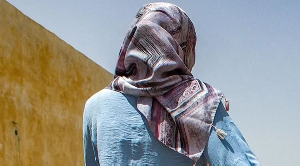 Several women have taken their lives in Sudan's central Gezira
Several women have taken their lives in Sudan's central Gezira
Warning: This story contains details some may find distressing.
Several women have taken their lives in Sudan's central Gezira state after being raped by paramilitary fighters in the brutal civil war raging in the country, rights groups and activists have said.
The reports come after the paramilitary Rapid Support Forces (RSF) was accused by the UN of "atrocious crimes", including mass killings, in the state last week.
With RSF fighters continuing to advance, one rights group has told the BBC it is in contact with six women who are contemplating taking their own lives as they fear being sexually assaulted.
But the RSF has dismissed a recent UN report blaming a rise in sexual violence on its combatants, telling the BBC the accusations "were not based on evidence".
The vicious struggle for power between the army and RSF has killed tens of thousands of people and forced more than 11 million people from their homes since the conflict began in April 2023.
The head of the UN World Food Programme, Cindy McCain, visited the aid hub of Port Sudan this week, and told the BBC that the country could see the world's largest-ever humanitarian crisis if a ceasefire is not reached.
She warned that millions of people could die from starvation.
*'Rape me, not my daughter', women tell BBC of civil war experience
*A simple guide to the Sudan war
*'Our future is over': Forced to flee by a year of war
Reports of paramilitary fighters on the rampage in Gezira follow the recent defection to the army of Abu Aqla Kayka, the RSF’s top commander in the state.
"The RSF started a revenge campaign in areas under the control of Abu Kayka. They looted, killed civilians who were resisting and raped women and little girls," Hala al-Karib, head of the Strategic Initiative for Women in the Horn of Africa (Siha), told the BBC.
Siha, which has been documenting gender-based violence in Sudan during the war, had confirmed three cases of suicide by women over the last week in Gezira state, she said.
Ms Karib said that two were in the village of Al Seriha and a third in the town of Ruffa.
The sister of a woman who took her own life in the village told Siha it happened after she was raped by RSF soldiers in front of her father and brother. The two men were later killed.
A series of videos have been shared online over the last week that appear to show dozens of bodies wrapped in blankets from an alleged RSF massacre in Al Seriha.
BBC Verify has been able to match the location of this footage to the courtyard of a mosque in Al Seriha.
The evidence of suicides came from only two areas out of the 50 or so villages that have recently come under attack, Ms Karib said, adding that the figure could be higher as mobile communications were patchy.
A female activist from Gezira, who asked to remain anonymous as she feared for her life, told the BBC she had confirmed accounts of women taking their lives after their husbands had been killed by the RSF.
She had seen WhatsApp messages from one woman who described how her sister had taken her own life after being raped by RSF militiamen, who had also killed five of her brothers and some of her uncles also in Al Seriha.
But like Siha, she said it was impossible to verify accounts on social media of reported mass suicides of women fearing rape given the communication problems.
On Tuesday, an 80-page UN report said that since the conflict began, at least 400 survivors of conflict-related sexual violence have been documented up to July 2024, with the actual figure suspected to be much higher.
"The sheer scale of sexual violence we have documented in Sudan is staggering," said Mohamed Chande Othman, the UN chair of the panel that compiled the report.
Victims it documented have ranged from between eight and 75 years - with many of them needing medical treatment, but most hospitals and clinics have been destroyed in the fighting, the UN said.
RSF spokesperson Nizar Sayed Ahmed told the BBC: “These accusations are false and not based on evidence.
“To find out the facts on the ground, the UN must send a fact-finding team to Sudan,” he said.
Ms Karib told the BBC Siha was trying to keep in touch with the six women who were fearful of the RSF’s advance and contemplating taking their own lives.
She said Siha was giving them psychological support as activists tried to work out how they could move them to more secure locations.
She also said they were trying to help a 13-year-old girl who had been gang-raped by RSF fighters in Gezira and was in urgent need of medical care.
The girl was currently on the road from her home village north of Ruffa to the town of New Halfa, and was bleeding profusely, she said.